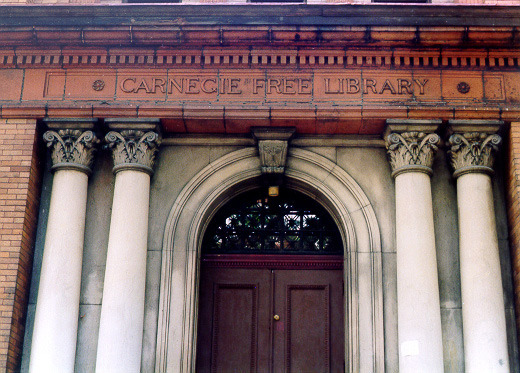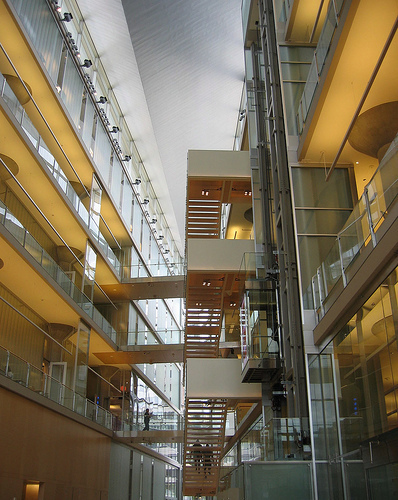Ode to Libraries
 I often insist to people who ask about my early education that Catholic school was just fine for preparing me in the ways of the three R’s, even if I did believe, upon high school graduation, that the world consisted of Catholics, Jews, and protesters. I could diagram my sentences, perform passable algebraic calculations, type 85 words per minute, and name every state capitol city (Trenton! Montpelier! Madison!). But more importantly I had a curiosity for learning and wanted to get the hell out of Dodge. For while parochial school had some fine qualities for me the student, it certainly lacked in other areas, like its library.
I often insist to people who ask about my early education that Catholic school was just fine for preparing me in the ways of the three R’s, even if I did believe, upon high school graduation, that the world consisted of Catholics, Jews, and protesters. I could diagram my sentences, perform passable algebraic calculations, type 85 words per minute, and name every state capitol city (Trenton! Montpelier! Madison!). But more importantly I had a curiosity for learning and wanted to get the hell out of Dodge. For while parochial school had some fine qualities for me the student, it certainly lacked in other areas, like its library.
I read through most of the sections by 5th grade, and I only started at that school as a third-grader. Soon enough I was pestering my mother to get a Princeton Public Library card, and devouring books on maritime history, the American Civil War, young adult fiction, and anything by Stephen King. Now there were too many books for me to read, but I took that as a challenge instead of demotivation. Nothing suited a precocious child more than the idea that the world’s knowledge is just at their fingertips.
Libraries today face an almost dystopian future—local funding cuts across the country have left their budgets at little more than nominal levels, many libraries have severely reduced hours of service, or no full-time employees, or very little money to get new books. In communities across the country, strapped counties and cities have pulled money out of libraries so they can continue other services like law enforcement and waste disposal. But what are we losing as a nation without a strong free library system?
 Here are just a few of the benefits of libraries and what they do for their local communities:
Here are just a few of the benefits of libraries and what they do for their local communities:
They offer free Internet access
They have the latest in fiction and popular nonfiction
They often have a notary public on site
They house local history and often, special collections about the area
They host reading hours and events for children
They help instill a love of reading and learning for the next generation
They often assist job seekers
They have a wide range of periodicals
They often have agreements with other library systems so small town users have access to larger collections from other places
They have DVDs and music CDs
They may have reference librarians who can help with research or deeper information needs
They have good spaces for reading and writing
They often have meeting rooms that the public can schedule
Did I mention the free books?
There has been no time in my life when I didn’t have a library card in my wallet, except when I was a college student, and then I had access to more books than ever, what with Syracuse University’s million-plus collection at Bird Library (not to mention the other five libraries on its campus at the time). While we moan about what government doesn’t do for us and how all of the politicians seem to hate actual people, let’s remember libraries and real open access. Nothing can make the playing field of economic privilege level, but libraries can flatten it out a bit.
Here in Walla Walla there’s a storm brewing because the city and county libraries, which decades ago agreed to support each other when they could—this included sharing some budget windfalls—are now arguing over a $3 million surplus held by the county when the city could use some of that money to support its library services. Instead the county wants to build a new library building with the money. County commissioners, who are not in direct control of the rural district library board, asked the board to put the project on hold, in light of so much public outrage at the plan. Complicating this discussion is the belief that the county library board kept these funds secret from the entire community while it brewed its project for the new facility, and when the city library sorely needed sustaining funds. Surely this impasse is not helpful for the readers of the region, and even though it abets discussions around funding and budgets, it distracts from a fuller conversation that we need to have regarding library services.
For me, I want my kid to have the same excitement about reading and experiencing new worlds via books that I had in my youth. I hope the country can find a way to keep libraries going and not politicize this issue, like so many others. I love you, library. Here is a more proper ode to you. Thank you, library, for making me smart(er).





